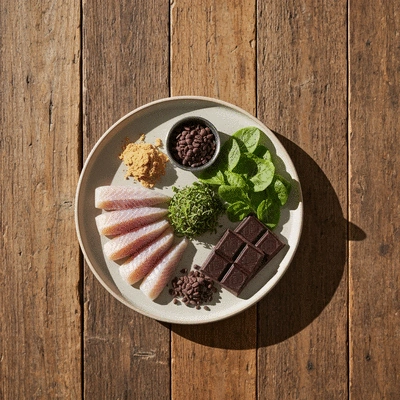Research shows that food's influence on our emotions goes beyond taste; it can evoke cherished memories and impact our mental well-being. Understanding this connection can transform how we approach our meals. Let’s explore the key takeaways from this insightful article.
What You Will Learn
- Therapeutic foods such as fatty fish and dark chocolate can significantly boost mood and cognitive function.
- The sense of smell is deeply linked to memory recall, making certain foods potent triggers for positive emotional memories.
- Comfort foods often evoke feelings of safety and love, playing a crucial role in our emotional health.
- Incorporating foods rich in antioxidants and omega-3 fatty acids can help foster emotional resilience.
- Mindfulness in eating enhances the dining experience, strengthening emotional connections to food through reflection and presence.
- Sharing meals and stories with loved ones can deepen emotional bonds and create lasting memories.
The Emotional Impact of Therapeutic Foods
Discover how specific foods nourish both body and mind, fostering positive emotional connections and enhancing mental well-being.
Foods Influencing Mental Health
- •Fatty Fish: Omega-3s boost mood.
- •Dark Chocolate: Flavonoids enhance brain function.
- •Leafy Greens: Vitamins support mental clarity.
- •Fermented Foods: Promote gut health & emotional well-being.
Foods Triggering Positive Memories
- •Blueberries: Spark joy & nostalgia (antioxidants).
- •Walnuts: Support brain health & comfort (omega-3s).
- •Dark Chocolate: Source of happiness (flavonoids).
- •Avocado: Emotional balance in comfort dishes.
- •Fermented Foods: Mood-enhancing (probiotics).

Understanding the Connection Between Food and Emotions
Food isn’t just sustenance; it’s deeply intertwined with our emotions and mental well-being. Each time we savor a meal, we’re not only experiencing flavors but also activating a symphony of memories and feelings. At Born Foodie, I believe that the connection between food and emotions is a powerful narrative worth exploring. Have you ever noticed how a simple dish can evoke memories of family gatherings or childhood adventures? It’s these connections that we should cherish and understand. For a deeper dive into how food creates lasting impressions, explore our article on emotional food memories and eating.
Research increasingly shows that our diet can significantly influence our mental health. For instance, therapeutic foods like omega-3-rich fish or antioxidant-packed berries have been linked to improved mood and cognitive function. By focusing on how therapeutic foods impact our emotional landscape, we can start to appreciate the importance of what we consume in our everyday lives.
How Therapeutic Foods Influence Mental Health
When we talk about therapeutic foods, we're referring to items that not only nourish our bodies but also uplift our spirits. Incorporating these foods can lead to a more balanced emotional state and even enhance our cognitive abilities. Here are some therapeutic foods to consider:
- Fatty Fish - Rich in omega-3 fatty acids that boost mood.
- Dark Chocolate - Contains flavonoids that enhance brain function.
- Leafy Greens - Packed with vitamins that support mental clarity.
- Fermented Foods - Promote gut health and emotional well-being.
By understanding the science behind these foods, we can harness their power to foster emotional resilience. It’s fascinating to see how simple dietary changes can lead to profound shifts in our mental health!
The Science Behind Positive Emotional Memories and Diet
Scientific studies reveal that certain foods can trigger positive emotional memories, creating a sense of comfort and happiness. For example, the smell of freshly baked bread might transport you back to your grandmother's kitchen, where laughter and warmth filled the air. These emotional ties to food are not just nostalgic; they can also play a crucial role in our mental well-being. To learn more about this fascinating subject, check out The Science of Childhood Food Connections.
When we consume foods associated with happy memories, our brains release feel-good hormones like serotonin and dopamine. This is why we often turn to our favorite comfort foods during stressful times. Here are some key points about the emotional impact of food:
- Positive memories associated with food can improve mood.
- The sense of smell is closely linked to memory recall.
- Comfort foods often evoke feelings of safety and love.
So, next time you enjoy a meal, pay attention to the memories it stirs. Embracing these emotional connections can enhance our culinary experiences, making each bite more meaningful. Let's savor every moment together at Born Foodie!
Interactive Poll: Share Your Thoughts!
How does food influence your emotions? We’d love to hear your experiences! Select one of the options below:

Recapping the Therapeutic Power of Foods
As we navigate through the intricate relationship between food and emotions, it's clear that what we eat can significantly influence our mental health and overall well-being. Foods like blueberries, walnuts, and dark chocolate don't just tantalize our taste buds; they also nourish our minds and evoke cherished memories. By embracing these therapeutic foods, we can foster a more positive emotional landscape and enhance our quality of life!
Key Takeaways on Foods that Trigger Positive Memories
Reflecting on the powerful connection between culinary delights and emotional experiences, here are some key takeaways:
- Blueberries: Rich in antioxidants, they spark joy and nostalgia.
- Walnuts: Known for their omega-3s, they support brain health and comfort.
- Dark Chocolate: This sweet treat is a source of happiness and fond recollections.
- Fatty Fish: A powerhouse for mood improvement and family meal memories.
- Leafy Greens: Essential for cognitive health with deep-rooted cultural significance.
- Avocado: Creamy and indulgent, it offers emotional balance in comfort dishes.
- Fermented Foods: Probiotics enhance mood and connect us with culinary traditions.
Each of these foods contributes not only to our physical health but also to our emotional well-being. By incorporating them into our diets, we can reignite joyful moments and create new emotional associations.
Encouraging a Mindful Approach to Eating for Emotional Health
Mindfulness in eating isn't just a trend; it's a transformative practice. At Born Foodie, I believe that savoring each bite can enhance our experience and strengthen our emotional bonds with food. Here are some tips to foster a mindful approach:
- Slow down: Take your time to enjoy your meals and connect with the flavors.
- Be present: Eliminate distractions like screens during mealtime to enhance focus.
- Reflect: Think about the memories that certain dishes evoke as you eat.
- Experiment: Try new recipes that incorporate therapeutic foods and explore their emotional impact.
- Share meals: Create connections by sharing dishes and stories with friends and family.
By cultivating mindfulness, we can not only improve our relationship with food but also promote emotional health. The kitchen becomes a space for connection, reflection, and joy! For more insights into how to foster a deeper connection with your meals, consider exploring emotional ties in signature dishes.
Frequently Asked Questions (FAQs)
How do foods influence our emotions?
Foods influence our emotions by triggering memories, impacting mental well-being through their nutritional content (e.g., omega-3s, antioxidants), and evoking feelings of comfort and safety.
What are therapeutic foods and how do they benefit mental health?
Therapeutic foods are those that nourish both the body and mind, contributing to positive emotional connections and enhanced mental well-being. Examples include fatty fish for mood, dark chocolate for brain function, leafy greens for mental clarity, and fermented foods for gut health and emotional balance.
Can specific foods trigger positive emotional memories?
Yes, scientific studies show that certain foods can trigger positive emotional memories and create a sense of comfort and happiness. The sense of smell is particularly linked to memory recall, making some foods powerful triggers for nostalgic feelings.
Why do we often turn to comfort foods during stressful times?
We often turn to comfort foods during stressful times because they are associated with happy memories and trigger the release of "feel-good hormones" like serotonin and dopamine in our brains, providing a sense of safety and love.
What is mindful eating and how can it improve emotional health?
Mindful eating is a practice that involves slowing down, being present without distractions during meals, reflecting on the memories food evokes, and sharing meals with others. It can improve emotional health by strengthening our connection with food, enhancing the dining experience, and promoting a sense of joy and reflection.
Recap of Key Points
Here is a quick recap of the important points discussed in the article:
- Food and Emotions: Food is deeply connected to our emotional well-being, evoking memories and feelings.
- Therapeutic Foods: Incorporating omega-3-rich fish, dark chocolate, leafy greens, and fermented foods can enhance mood and cognition.
- Positive Memories: Foods associated with happy memories can boost our mood and provide comfort during stressful times.
- Mindful Eating: Practicing mindfulness during meals, such as savoring flavors and eliminating distractions, can strengthen our relationship with food.
- Creating Connections: Sharing meals and stories with loved ones enriches our culinary experiences and emotional health.






